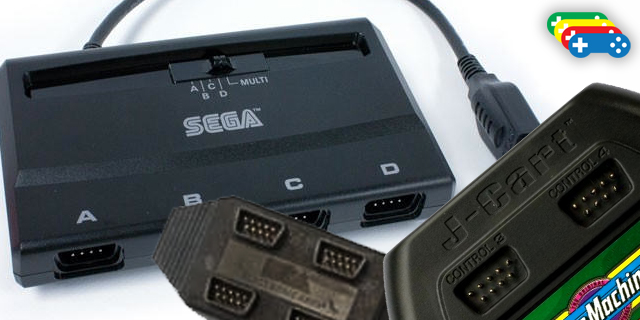
The Sega Genesis, which just celebrated the 25th anniversary of its American release, was notoriously a bit of a mess in the multiplayer department. Instead of a unified first-party effort, there were three competing schemes for allowing up to four players at once, and compatibility is… well, it’s a headache. But there are ways to get around that, and there are games worth that effort!
Before we dive into the games themselves, let’s sort out that compatibility thing. The main contenders here were Sega’s own Team Player and EA’s 4 Way Play. There were advantages to both! EA’s was a compact, cheap device, and the company itself supported it with lots of games (including its marquee sports franchises). Unfortunately, it is incompatible with hardware that doesn’t have the Genesis ports in the exact configuration of the standard system. The Team Player is more of a traditional multitap, allowing for better compatibility and even the option to use it as a controller switch for single-player titles, but it, well, wasn’t compatible with all those good EA games.
Luckily, there are two solutions these days: either track down a late-model revision of the Team Player that added in compatibility (the main difference: it has two controller plugs instead of one), or play the games on a system like the RetroN 5. (Some later games also supported both adapters, too.) Adding to the confusion (but not so much the headache) is Codemasters’ line of “J-Cart” releases, with controller ports mounted directly in the cartridge itself. These were Europe-only releases, but the games may be worth tracking down anyway.
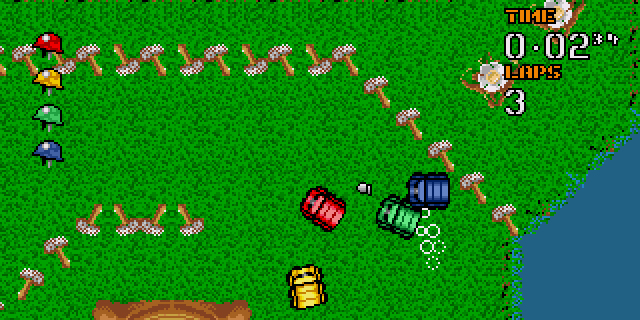
A good multiplayer game has to have at least one of these four aspects, and the more it has, the better:
 Party-friendly: This one’s easy to pick up for newcomers and enjoy the first time even against stiff competition. It’s also good for spectators.
Party-friendly: This one’s easy to pick up for newcomers and enjoy the first time even against stiff competition. It’s also good for spectators.
 Deep: Multiplayer games tend to be rather evanescent. These games have more meat on their bones, and stand up to multiple sessions or lots of consecutive hours of play on content variety alone.
Deep: Multiplayer games tend to be rather evanescent. These games have more meat on their bones, and stand up to multiple sessions or lots of consecutive hours of play on content variety alone.
 Competitive: These are the games you play against your friends, build up skills and keep on challenging each other as you go. They’re addictive because of the rivalries they create.
Competitive: These are the games you play against your friends, build up skills and keep on challenging each other as you go. They’re addictive because of the rivalries they create.
 Cooperative: There’s something about working together with friends that can really make an experience special. These do it, and they do it well.
Cooperative: There’s something about working together with friends that can really make an experience special. These do it, and they do it well.



 Games can have smaller bits of these elements, and for those, I’m giving them these minibadges. I didn’t forget about these parts of these games, but they may not define the core experience.
Games can have smaller bits of these elements, and for those, I’m giving them these minibadges. I didn’t forget about these parts of these games, but they may not define the core experience.
Anyway, onto the list:
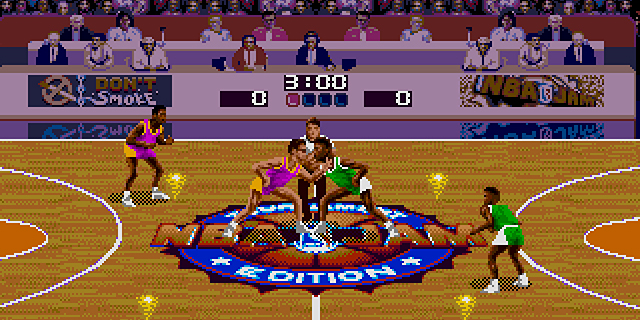
Sega Team Player

 NBA Jam: Tournament Edition: NBA Jam had many ports and versions, but almost all of them were a blast to play. Tournament Edition represents the peak entry on the Genesis, with fun power-ups and such for occasional players and expanded rosters and “tournament” settings for diehards. To this day, people remember the rosters of this game, and with good reason: the teams played legitimately differently. If you’re just starting out, our suggestions would be to check out the Hornets or the Spurs and tear opponents up with dunks and power.
NBA Jam: Tournament Edition: NBA Jam had many ports and versions, but almost all of them were a blast to play. Tournament Edition represents the peak entry on the Genesis, with fun power-ups and such for occasional players and expanded rosters and “tournament” settings for diehards. To this day, people remember the rosters of this game, and with good reason: the teams played legitimately differently. If you’re just starting out, our suggestions would be to check out the Hornets or the Spurs and tear opponents up with dunks and power.

 Columns III: Multitap’s love for puzzle games is well-documented, and Columns III represents the Genesis’ contribution to the lineup. The only more-than-two-player version of Columns, it allows up to five opponents to head in and match some gems. What makes it different, though, is its approach to attacking. Rather than damaging all opponents, it lets you choose to send attacks to the player to the left or right by hitting the appropriate button, making monitoring opponents that much more crucial.
Columns III: Multitap’s love for puzzle games is well-documented, and Columns III represents the Genesis’ contribution to the lineup. The only more-than-two-player version of Columns, it allows up to five opponents to head in and match some gems. What makes it different, though, is its approach to attacking. Rather than damaging all opponents, it lets you choose to send attacks to the player to the left or right by hitting the appropriate button, making monitoring opponents that much more crucial.

 Tiny Toons Adventures: Acme All-Stars: Maybe you’re up for a sports game with a bit more whimsy? Tiny Toons Adventures embraces the NBA Jam and Nintendo World Cup style of action-sports and brings in Buster and Plucky to compete with special powers. It’s a bit clunky by today’s standards, but there’s definitely something to learning each toon’s strengths and weaknesses and matching up accordingly.
Tiny Toons Adventures: Acme All-Stars: Maybe you’re up for a sports game with a bit more whimsy? Tiny Toons Adventures embraces the NBA Jam and Nintendo World Cup style of action-sports and brings in Buster and Plucky to compete with special powers. It’s a bit clunky by today’s standards, but there’s definitely something to learning each toon’s strengths and weaknesses and matching up accordingly.
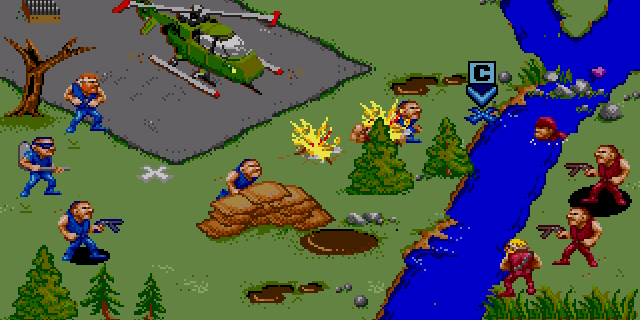
EA 4 Way Play

 General Chaos: You know, General Chaos would fit in well with the modern couch-play renaissance. The single-screen small-squad RTS is about positioning and action and explosions and, well, general chaos. You pick your various squad members’ specialties, making it not just a mirror match, and getting help from a friend can make everything much more manageable.
General Chaos: You know, General Chaos would fit in well with the modern couch-play renaissance. The single-screen small-squad RTS is about positioning and action and explosions and, well, general chaos. You pick your various squad members’ specialties, making it not just a mirror match, and getting help from a friend can make everything much more manageable.

 FIFA Soccer 95: If you’re heading back into the land of 4 Way Play, you really should check out one of EA’s main sports games, and FIFA 95 may be the best of the bunch for local multiplayer. It controls well, and it allows for interesting play even when you don’t have the ball (a typical problem with sports titles). Later releases were fine, but you can tell that the focus switched to the next generation of systems, leaving this entry as the one that received the most care and attention.
FIFA Soccer 95: If you’re heading back into the land of 4 Way Play, you really should check out one of EA’s main sports games, and FIFA 95 may be the best of the bunch for local multiplayer. It controls well, and it allows for interesting play even when you don’t have the ball (a typical problem with sports titles). Later releases were fine, but you can tell that the focus switched to the next generation of systems, leaving this entry as the one that received the most care and attention.

 Mutant League Hockey: NHL ’94 is great and all that, but who wants to be normal boring humans? After the success of Mutant League Football came this hockey iteration, and it combines what’s good about real hockey with some particularly game-like mechanics and trappings. It does make us wonder if crazy-sports games are due for a comeback.
Mutant League Hockey: NHL ’94 is great and all that, but who wants to be normal boring humans? After the success of Mutant League Football came this hockey iteration, and it combines what’s good about real hockey with some particularly game-like mechanics and trappings. It does make us wonder if crazy-sports games are due for a comeback.
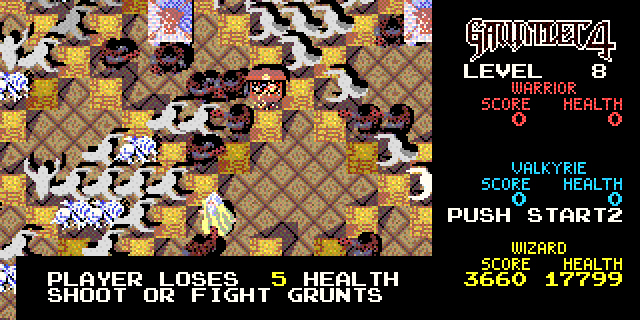
Both Team Player and 4 Way Play

 Gauntlet IV: There are likely much better ways to spend your time if you’re looking for a dungeon crawler these days, but as a curiosity, there’s certainly appeal in Gauntlet IV. It plays much like the original Gauntlet, but technically pushes the formula as far as it could before moving on to the Legends era. An intriguing addition to this release was a battle mode, allowing players to use the Gauntlet mechanics to take each other on in arena battles. (You know, intentionally this time.)
Gauntlet IV: There are likely much better ways to spend your time if you’re looking for a dungeon crawler these days, but as a curiosity, there’s certainly appeal in Gauntlet IV. It plays much like the original Gauntlet, but technically pushes the formula as far as it could before moving on to the Legends era. An intriguing addition to this release was a battle mode, allowing players to use the Gauntlet mechanics to take each other on in arena battles. (You know, intentionally this time.)

 Mega Bomberman: What system would be complete without a multitap-compatible Bomberman game? This port of Bomberman ’94, one of the more well-regarded entries in the series, allows you to run around, place bombs, collect power-ups and generally do the things that are done in a Bomberman game. It may not be particularly special in its own right or worth playing over the TG-16, SNES or Saturn installments, but it’s capable of holding its own with its Genesis peers.
Mega Bomberman: What system would be complete without a multitap-compatible Bomberman game? This port of Bomberman ’94, one of the more well-regarded entries in the series, allows you to run around, place bombs, collect power-ups and generally do the things that are done in a Bomberman game. It may not be particularly special in its own right or worth playing over the TG-16, SNES or Saturn installments, but it’s capable of holding its own with its Genesis peers.
Codemasters J-Cart

 Micro Machines Military: None of the Micro Machines J-Cart games were released outside of PAL territories, but usually some form of the game made it to America through ports of some sort. That’s not the case for the Military edition, which was based on the tanks and weapons of the toy line but retained the series’ same great gameplay.
Micro Machines Military: None of the Micro Machines J-Cart games were released outside of PAL territories, but usually some form of the game made it to America through ports of some sort. That’s not the case for the Military edition, which was based on the tanks and weapons of the toy line but retained the series’ same great gameplay.



















